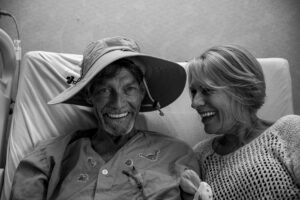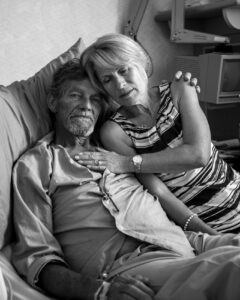Seven Strategies For Support When Expecting Death
The creative arts are an immensely challenging industry and turning passion to profession often requires sacrifice, and sometimes that’s taking work that doesn’t necessarily speak to the soul. And that’s ok, we all need to eat. But creativity is fire that needs fuel. Engaging in personal projects are a great way to stoke the side of you that first picked up your muse.
In 2015, my uncle spoke to our family about his experience dealing with a terminal illness. His willingness to engage with his mortality left me completely grounded, demanded a fresh perspective and enriched my outlook on death and loss. It ignited a desire to create a project around loss and mortality. I had been shooting portraits and headshots in Vancouver, but my camera is a tool I use to engage with, and understand the world better. That’s what fuels my fire. I had planned to volunteer at a hospice and create imagery around conversations with the people facing the end-of-life. However, all of a sudden, my dad became sick. All of a sudden, my dad became the subject.

Since photographing the last 19 days of his life, I’ve been on a journey to try to help people through their grief and their loss. I decided to share 7 strategies for support, for people going through the process of losing someone. It’s a topic I am deeply embedded in, and a topic I continue to build projects around. These are just a few lessons I was left with when my dad’s dust settled, and I hope they help bring comfort to those embarking on their own journey.
1. Photograph

Though I write, photographs are largely my journal. When I write, it’s usually after the event, and I use photographs to jog my memory and to stir my emotions. Photos bring me back to the moment. Yes, some of the images of my dad might be hard to look at. And yes, some of the moments might be hard to go back to. But 4 years on, I find myself coming back to those photos time and time again. They help me remain close to him. They remind of how I felt about him in those moments, how I felt about him before he looked like that, and how I felt about him despite looking like that. Though sometimes difficult, they provide me with an opportunity to sit with the grief I feel in losing him, to flow with life’s ebbs and eddies, to find riches in the raw and to feel the beauty in experiencing all life has to offer. But most of all they remind me to be grateful of what I had, and what I still have. So, grab a camera. Document the moments, big and small. You can always delete them, or file them away somewhere for another time as you move through seasons in your grieving.
2. Journal

I didn’t write much during the process. Photographs were my focus and became my words. But reading through my mother’s writing reminds of little moments lost from my memory. Losing someone is overstimulating. Your senses are struck, and it’s impossible for the mind to register it all. But writing in the moment helps distill it and record it. Reading it lets you feel the parts you want to feel all over again and reminds you of what your mind filed away. So, sit with a pen and paper, grab a glass of wine and type and tap away on your keyboard. Your words will be your house when a home is needed most.
3. Video

Though I have photographs from our journey, 4 years on, it’s his voice I miss. The way he spoke, the words he used – the little idiosyncrasies of syntax that made him my dad and gave him his voice. I wish I had more video of our last weeks. I wish we had more video of all of our time together. We now all have the gift of a video camera in our pocket. So, if you know a death is coming, grab a camera. It doesn’t have to be fancy – grab your phone. It doesn’t have to be complicated – press record. These potent videos will be real life remedies in some of your darker moments.
4. Take the time to have one-on-ones early

The nurses in the palliative ward at the hospital pushed us to take time to have a one-on-one chat while my dad was still completely cognizant and capable. They stressed this over and over. But I didn’t listen, and now I wish I had. By the time I finally sat with him quietly, we had already been transferred to hospice care. The toxins and drugs flowing through his blood and brain made any real cognitive conversation impossible. He was already gone. So, do it before you’re ready to face the inevitable. Make a list of questions you always wanted to ask. Ask them. Make a list of all the things you’ve wanted to say. Say them. You’ll regret more the things you didn’t say than the things you said.
5. Invite friends to visit

I recognize we had many gifts in the way things ended with my dad. Despite his condition, he was (mostly) lucid, and always engaging. Not everyone gets this. But friends from all walks of life visited. His friends, my friends, our friends. My dad has been dead for 4 years now and being able to talk about those moments with people who were actually there gives me incredible comfort and helps me feel close to him despite the distance from those days. So check-in with the family and make sure everyone is on-board, but allow friends into the sacred space. It will remain that way for much longer with the strength of numbers.
6. Take time for yourself

This should seem like a no-brainer. Or, maybe your brain says no! I want to be there for the entire process. I battled with this. Not wanting to leave my family’s side was a real thing. While we were in the hospital, and as it turned out, only 10 days before he died, a childhood friend was getting married. I wrestled with the guilt from going to be with friends for a night. But perspective is important – just as breathing is. Take a breath. Take a breather. Take time away, whatever time your situation will allow and reflect on the magnitude of what you’re experiencing. You will return reinvigorated and with another layer of understanding.
7. Finally, don’t be afraid to feel

Some of my most impactful breakdowns – or call them breakthroughs – came when I allowed myself to feel. The rawness of death is unparalleled. Its depths are dark and difficult. Overwhelmed and overcome, people fear feeling the intensity of death’s emotional dealings. But the problem is not what we feel, it’s what we refuse to feel (Raphael Cushnir). Documenting my dad’s death brought me face to face with a full gamut of emotions. But it took six months of gnawing at my gut before the anger finally burst through, kicking at my lungs and streaming down my face. I had pushed it, punched it, avoided it and run from it, opting for what I thought was the higher road. I had refused to acknowledge it, and in doing so, robbed myself of the honesty of emotion, and with it the natural flow of joy following its authenticity. If you despair and see no hope, say it. If you’re detached, say it. If you’re afraid to let yourself feel, say it. If you can’t conceive of a life without that person present, say it. Because either way, it will find a way out of you.
Josh Neufeld is a photographer based in Vancouver, BC.
He shared the last 19 days of his dad’s life through photographs and words, and doing so allowed him to connect with many others experiencing something similar. He built www.griefnarratives.com, an online platform for people to read and share peoples’ stories of grief and loss. You can connect with him through email at: [email protected], on Instagram at @joshneufeldphoto or @griefnarratives, and read his story on his website, www.joshneufeldphotography.com
